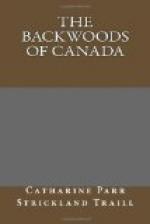The tops of the stumps look quite pretty, with their turbans of snow; a blackened pine-stump, with its white cap and mantle, will often startle you into the belief that some one is approaching you thus fancifully attired. As to ghosts or spirits they appear totally banished from Canada. This is too matter-of-fact country for such supernaturals to visit. Here there are no historical associations, no legendary tales of those that came before us. Fancy would starve for lack of marvellous food to keep her alive in the backwoods. We have neither fay nor fairy, ghost nor bogle, satyr nor wood-nymph; our very forests disdain to shelter dryad or hamadryad. No naiad haunts the rushy margin of our lakes, or hallows with her presence our forest-rills. No Druid claims our oaks; and instead of poring with mysterious awe among our curious limestone rocks, that are often singularly grouped together, we refer them to the geologist to exercise his skill in accounting for their appearance: instead of investing them with the solemn characters of ancient temples or heathen altars, we look upon them with the curious eye of natural philosophy alone.
Even the Irish and Highlanders of the humblest class seem to lay aside their ancient superstitions on becoming denizens of the woods of Canada. I heard a friend exclaim, when speaking of the want of interest this country possessed, “It is the most unpoetical of all lands; there is no scope for imagination; here all is new—the very soil seems newly formed; there is no hoary ancient grandeur in these woods; no recollections of former deeds connected with the country. The only beings in which I take any interest are the Indians, and they want the warlike character and intelligence that I had pictured to myself they would posses.”
This was the lamentation of a poet. Now, the class of people to whom this country is so admirably adapted are formed of the unlettered and industrious labourers and artisans. They feel no regret that the land they labour on has not been celebrated by the pen of the historian or the lay of the poet. The earth yields her increase to them as freely as if it had been enriched by the blood of heroes. They would not spare the ancient oak from feelings of veneration, nor look upon it with regard for any thing but its use as timber. They have no time, even if they possessed the taste, to gaze abroad on the beauties of Nature, but their ignorance is bliss.
After all, these are imaginary evils, and can hardly be considered just causes for dislike to the country. They would excite little sympathy among every-day men and women, though doubtless they would have their weight with the more refined and intellectual members of society, who naturally would regret that taste, learning, and genius should be thrown out of its proper sphere.
For myself, though I can easily enter into the feelings of the poet and the enthusiastic lover of the wild and the wonderful of historic lore, I can yet make myself very happy and contented in this country. If its volume of history is yet a blank, that of Nature is open, and eloquently marked by the finger of God; and from its pages I can extract a thousand sources of amusement and interest whenever I take my walks in the forest or by the borders of the lakes.




